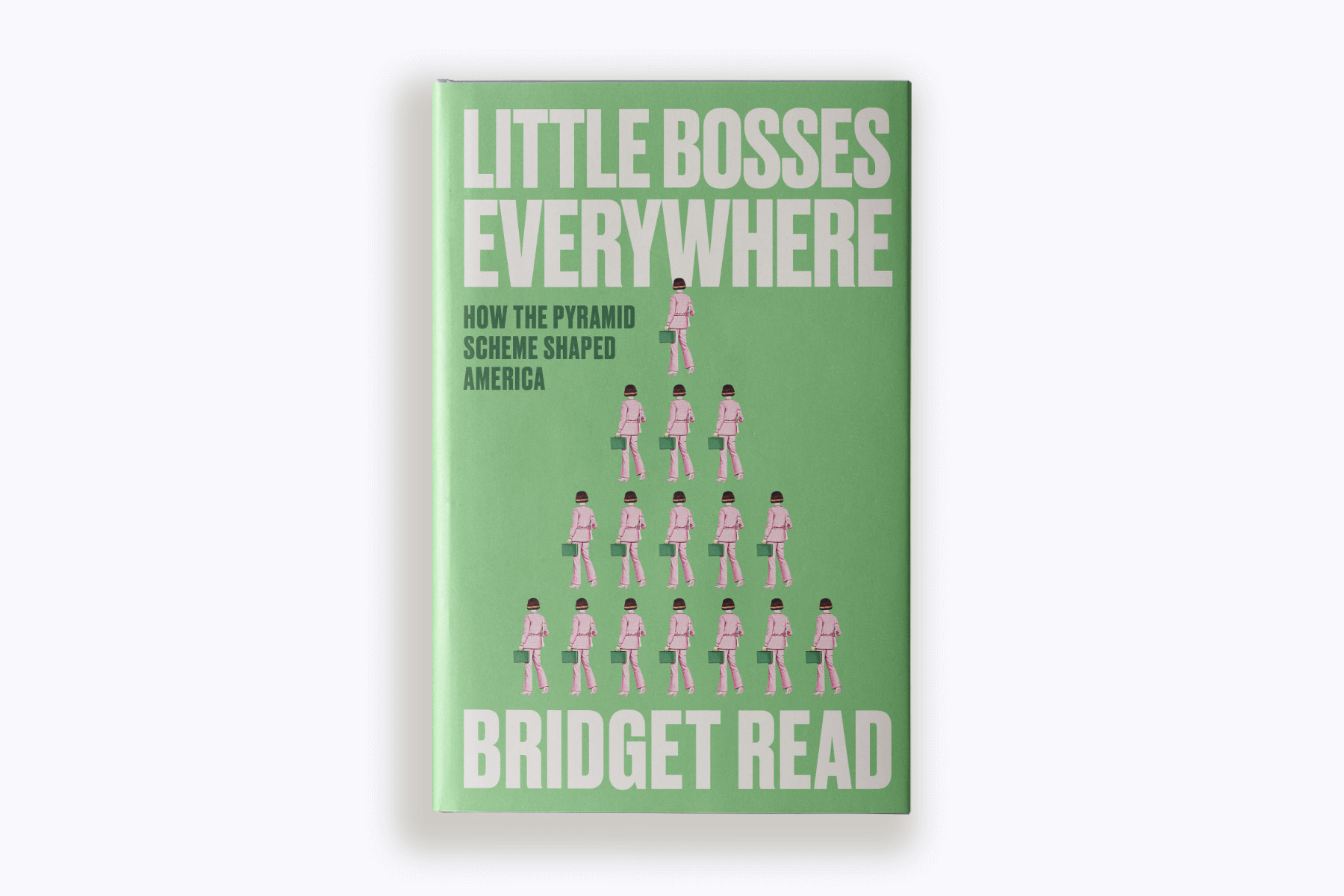They were reaching out via Facebook: The woman from middle school selling nutrition shakes, the woman from high school selling jewelry, the one from summer camp selling purses, the one I had met at a baby shower selling skin care. These business ventures, they said, would let them work from home around their commitments as mothers and, they claimed, make so much money they would soon be able to “retire their husbands.”
The final sales pitch was always the same: This could be available to me, too, if only I signed up through them to do the same.
In other words, they were all multi-level marketing (MLM) ventures. And these women who defined a huge part of my online experience were why I wanted to read “Little Bosses Everywhere: How the Pyramid Scheme Shaped America.”
In the book, Bridget Read, a features writer at New York Magazine, tells the story of how this phenomenon has been intimately intertwined with the history of America itself over the past 80 years. I rushed to read it, looking for answers on just why MLMs had become so pervasive and adept at selling women the idea that they could both be the ultimate girl boss and the consummate homemaker — an idea that I had felt as an undercurrent in my reporting on last year’s election.
I knew I wasn’t alone in seeing these connections. In her book, Read goes so far as to describe Project 2025 as sounding “like multilevel marketing.”
I spoke with Read about the connection between the core ideology of MLM and contemporary politics.
This conversation has been edited for clarity and length.
Jennifer Gerson: Your book really digs into the history of how MLM and American politics are closely intertwined. Now we are six months into the second Trump administration — what kind of postscript would you want to add today based on what we have seen so far?
Bridget Read: The robber baron class is back, but they’ve successfully rebranded that concentration of power as freedom: that the profits that they are able to make with as little oversight as possible will somehow trickle down to the rest of us to make us freer to take care of ourselves, our families, to make our own decisions. And it just couldn’t be further from the truth.
But they now have that buy-in from so many Americans, which we saw when [President Donald] Trump was reelected. In a multi-level marketing company, all of the people being exploited by it somehow think that they are going to have the ability to equally exploit people below them. It’s a chain of people who are underlings, but who participate because of the promise that they will be able to lord over their own pyramid under them.
-
Read Next:
In the book, you talk about how Trump, from birth, was just completely steeped in the language and culture of MLMs. Now that he’s back in office, how do you see this iterating?
Trump really embodies the MLM problem, which is that of a business that doesn’t run in the way that it says it does. It dangles opportunity in front of people and tells participants that they will make an income, make a living, change their circumstances through a method that doesn’t actually work. It dangles this ladder and then pulls it up at the same time.
Donald Trump has been doing that since day one. He’s been telling people that he’s a rich and wealthy guy — and if you want to be like me, here’s the way to do it. I think Trump is the ultimate MLM president.
You write about the way that this MLM ideology came to the fore for Trump during COVID and the way that the pandemic pushed many people further into this mindset. How did you see that continue to evolve during this past election cycle and how people thought about politics and identity?
MLM since the beginning has been a pitch that tries to trick people into thinking that you are becoming a business owner. People are drawn into MLM because of this idea that they will leave the worker class behind eventually, whether they work retail or a 9 to 5, and that they can leave that slog and actually become a member of the ownership class and transform their class status.
MLM has also always drawn on the tradition of positive thinking, eschewing expertise, eschewing intellectualism and science, in trying to push people into the idea that they are somehow not only joining this business opportunity, but are health mavericks or science mavericks or self-care mavericks.
The pandemic causing this economic disruption really just fed so many more people into that kind of thinking. It felt good to protect themselves by saying, “I know more than the scientists. I know more than [former director of the National Institute of Allergy and Infection Disease Anthony] Fauci. I am a part of this maverick group of people and they are going to save me.”
-
Read Next:
How do you think women specifically received this message during this election cycle? What parallels did you see between the Trump campaign and the MAGA movement in general and the foundation of MLMs and who it targets and how?
I think we saw that very directly in the election with Trump’s appeal through Robert F. Kennedy Jr. to MAHA [Make America Healthy Again supporters], who are predominantly women who, for very good reason probably, feel skeptical of institutions that are supposed to take care of them.
So many MLM women I have encountered have had health problems and they weren’t able to get adequate health care. So instead of taking that energy and thinking, “How can we restructure these systems for all of our benefit?” MLM and the forces around Trump this round really focused all that DOGE [Department of Government Efficiency] energy of tearing it all down.
I think that’s why you have a huge amount of voters who turned out to say, “Let me not vaccinate my kids.” “Let me not pasteurize my milk.” “I don’t want to send my kids to public school — give me money to send my kid to religious school or homeschool them.”
These are the methods of privatizing everything. And I think women in particular were served this idea that it was going to enable them to create this utopian, Ballerina Farm-esque life for themselves.
I asked you when we started talking about what postscript to the book you wish you could write today, knowing what the outcome of the 2024 election would be. But now I want to end with asking if you were able to keep reporting for the book today given this current political landscape, where would you be looking?
I think crypto has a huge, huge overlap with MLM. I think that crypto has simply inherited MLM’s Ponzi scheme structure and obviously, there’s a huge amount of political influence there.
I mean look at Trump’s [crypto] coin itself — do we need any more evidence? The very idea that we’re supposed to buy into this coin and it’s going to grow in value merely by other people buying the coin? Like, hello: Paging the literal definition of a pyramid scheme.







